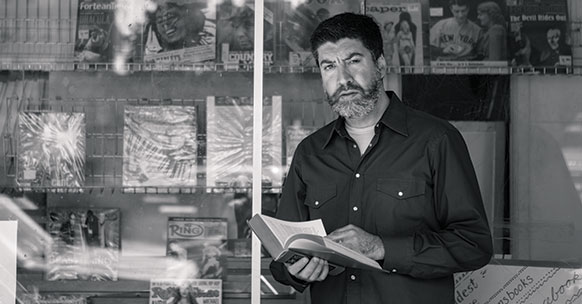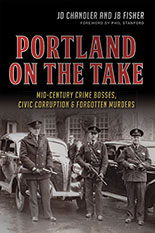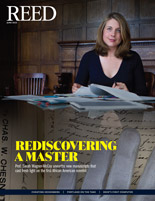
IRIS login | Reed College home Volume 94, No. 2: June 2015
Portland on the Take

Photo by Robert Delahanty
Benji Fisher ’94 probes Stumptown’s seedy past.
By Katelyn Best ’13
Late on the night of March 19, 1950, a young woman named Jo Ann Dewey was kidnapped from a street in Vancouver, Washington, in broad view of several onlookers. A week later, three fishermen discovered her body on the banks of the Wind River near Carson.
The killing shocked the community. Two brothers, Utah and Turman Wilson, were convicted of the murder and eventually hanged—but not before Clark County Sheriff Earl Anderson had quietly started making recordings of the brothers in their jail cell. Sheriff Anderson and Walter Graven, a retired Multnomah County detective he recruited for the case, soon realized that this was not a random killing. In fact, Dewey’s murder provided a glimpse into an intricate web of organized crime that would turn out to be intimately connected with the police department and the highest levels of city government.
Due to the very corruption they threatened to expose, Graven and Anderson’s findings wouldn’t see the light of day for more than 60 years, with the publication of Portland on the Take: Mid-Century Crime Bosses, Civic Corruption, & Forgotten Murders by JB “Benji” Fisher ’94 and JD Chandler.
For much of its history, Portland was known as a “wide-open” town where gambling and prostitution flourished. Although ordinary Portlanders kept the industry afloat, everyday horse-racing enthusiasts and nightclub patrons generally only brushed the surface of a criminal underworld whose influence reached all the way up to the mayor’s office. Central to the action was self-proclaimed vice czar Jim Elkins, a heroin addict who blew in from Arizona and built an empire on slot machines, burglary, and dope. Thanks to Elkins’ deep connections in city hall and the police bureau, straight-shooting cops who tried to shut him down would find their efforts thwarted—often by members of their own department.
“Graven left this whole trail,” Fisher says of the Dewey murder, but found that his chief “literally was not filing these reports,” preventing them from coming to light.

Portland on the Take:
Mid-Century Crime Bosses, Civic Corruption & Forgotten Murders
By JB “Benji” Fisher ’94 and JD Chandler
The History Press, 2014
Researching the extensive graft and corruption that plagued the city for decades involved sifting through piles of forgotten police reports, letters, and journals, and Fisher credits Reed with instilling in him a “curiosity that . . . translates into a rigor about research” into the “nitty-gritty and historical context” that he would need for this project. He cites his thesis adviser Prof. Robert Knapp [English 1974–] as a mentor. “He was really open to letting me take the initiative and be independent, and that was something I really hadn’t encountered before.”
After Reed, Fisher went on to earn a PhD in English from the University of Washington, and landed a job teaching early modern literature at Wingate University in North Carolina. In 2011, he and his wife, Catherine McClellan ’97, came back to Reed for Centennial Reunions, where Gary Snyder ’51 gave the keynote address. Although the couple was already thinking about moving back to Oregon, Snyder’s speech, which centered on the question of “how to be” in an ever-changing world, gave them the inspiration to take the leap.
Back in Oregon, Fisher was teaching writing at Chemeketa Community College when he came across a stack of copies of the Oregon Journal from 1958. A series of articles about a family that disappeared in the Columbia Gorge caught his eye. He started researching the case—in the process getting in touch with his coauthor, JD Chandler—and discovered a treasure trove of unsolved cases in Graven’s papers. Among these papers was a file on Jo Ann Dewey containing notes about a potential link between her and two other murder victims. At that point, Fisher says, he and Chandler “realized we really had a story to tell.”
While the central narrative revolves around Dewey, the authors were also eager to tell the story of Jim Elkins, whose shadow loomed large over Portland in the ’40s and ’50s. Though some of the story will be familiar to readers of Phil Stanford’s Portland Confidential or Robert C. Donnelly’s Dark Rose, many connections had never been fully explored.
So what was the real significance of Dewey’s murder? In short, she knew too much. She and her friends liked to hang around Burnside late into the night, in many of the same spots frequented by Elkins and his gang. One night, she let slip that she’d heard what happened to Roman Podlas, a merchant seaman who had been killed for getting on the wrong side of the Duncans, a powerful, well-connected Portland crime family.
Though Elkins may not have been directly involved in Dewey’s murder, he was likely responsible for getting the Wilson brothers collared for the crime: Utah and Turman had stolen around $3000 in nickels from Portland slot machines, which probably belonged to him as the slot machine kingpin. It was an associate of Elkins in the Portland police department, William “Big Bill” Browne, who told Vancouver police to pick them up.
Despite the drama of the Dewey story—Fisher conceives of her as “something of a Juliet figure”—both authors are clear that they are not interested in sensationalism, and use this narrative as a jumping-off point for a broader historical survey. They don’t shy away from the Rose City’s ugly side: the brutal labor crackdown that pitted unions against each other, or the fact that Portland was the only West Coast city where “white customers only” signs were hung in restaurants. There turns out to be a Reed connection, as well: Dewey was allegedly having an affair with a preacher in Camas, Washington, and the Clark County sheriff’s office apparently received a tip that he brought her on several occasions to a well-known Reed house he owned at 1414 Southeast Lambert.
Chandler is adamant that operations like those of Jim Elkins weren’t just permitted by government; they were actually a function of it. Police on the overworked vice squad—who were badly paid and generally couldn’t make a living without a little graft money—benefited from only having to enforce the law against nonapproved operations. And although Oregon voters passed Prohibition six years before the federal law went into effect, the mayor and his retinue kept right on drinking, using the evidence room in the central precinct as their liquor cabinet. Despite scattered efforts at reform, this system of corruption persisted for decades, keeping honest cops from connecting the dots on crimes like the Dewey case.
Going forward, Fisher is working on a book about the 1958 disappearance that originally sparked his interest. Meanwhile, he and Chandler are polishing a screenplay based on Portland on the Take.
As for Elkins, the beginning of the end came in 1956, when a number of prominent Portlanders, including Mayor Terry Schrunk, were hauled off to Washington to testify for a corruption investigation headed by Robert Kennedy that destroyed numerous political careers. Elkins’ own testimony sowed the seeds of his undoing. With his key lieutenants under indictment, his power evaporated and the kingpin slid into mental and physical decline, deepened by his heroin addiction. He was arrested numerous times, mostly for petty offenses like drinking and driving, and finally died of unknown causes in 1968, his empire nothing but a bitter memory.

LATEST COMMENTS
steve-jobs-1976 I knew Steve Jobs when he was on the second floor of Quincy. (Fall...
Utnapishtim - 2 weeks ago
Prof. Mason Drukman [political science 1964–70] This is gold, pure gold. God bless, Prof. Drukman.
puredog - 1 month ago
virginia-davis-1965 Such a good friend & compatriot in the day of Satyricon...
czarchasm - 4 months ago
John Peara Baba 1990 John died of a broken heart from losing his mom and then his...
kodachrome - 7 months ago
Carol Sawyer 1962 Who wrote this obit? I'm writing something about Carol Sawyer...
MsLaurie Pepper - 8 months ago
William W. Wissman MAT 1969 ...and THREE sisters. Sabra, the oldest, Mary, the middle, and...
riclf - 10 months ago